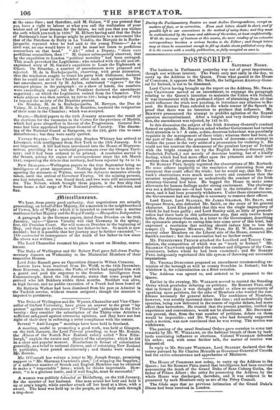POSTSCRIPT.
SATURDAY NIGHT.
The business in Parliament yesterday was not of great importance, though not without interest. The Peers only met early in the day, to carry up the Address to the Queen. From what passed in the House of Commons, it appears that Mr. Smith, the belligerent Attorney-Gene- ral for Ireland, is not to be dismissed.
Lord Cnrvis having brought up the report on the Address, Mr. SHAR- MAN CRAWFORD moved as an amendment, to expunge the paragraph relating to the Queen's intention to maintain the Union with Ireland. It was inconsistent with the professed object of abstaining from all that could influence the trials now pending, to introduce any allusion to Re- peal. Sir ROBERT PEEL referred to the whole tenour of the Speech in proof that there was no intention to produce that influence. Mr. BLEWITT pronounced the attempt to prohibit agitation of the Repeal question unconstitutional. After a longish and very desultory discus- sion, the amendment was rejected, by 142 to 35.
In this discussion the subject of the Irish Attorney-General's conduct formed an episode. Mr. ROEBUCK asked whether Government had turned their attention to it ? A calm, sedate, decorous behaviour, was peculiarly requisite in the management of those trials ; whereas there had been, on the part of that officer, the grossest breach of decorum—an attempt to violate the peace in the very midst of a prosecution for violating it. He could not but contrast the demeanour of the petulant lawyer of Ireland with the bright example set by the English Attorney-General, (Sir Frederick Pollock,) not merely of decorous bearing, but of a kindly feeling, which had bad more effect upon the prisoners and their con- nexions than all the process of the law. Sir ROBERT PEEL deeply regretted the observations of Mr. Roebuck. He must adhere implicitly to the resolution of abstaining from any statement that could affect the trials; but he would say, that Mr. Roe- buck's observations were much more severe and censorious than the occasion required, improper as undoubtedly the conduct of the Irish Attorney-General had been. He begged the House to make some allowance for human feelings under strong excitement. The challenge was not a deliberate act—it had been sent in the irritation of the mo- ment, and it had been presently withdrawn. Under these circumstances, the Government had not thought it necessary to remove their officer.
Lord ELIOT, Lord STANLEY, Sir JAMES GRAHAM, Mr. SHAW, and Sergeant STOCK, also defended Mr. Smith, on the score of his general
character. Lord Eliot pleaded that this was the single impropriety of which he had been guilty ; and Lord Stanley said, so little of premedi- tation had there been in this unfortunate step, that only twelve hours before, the Attorney-General, in a letter to the Government, describing the systematic attempts to entrap him into some error of this kind, had expressed a resolution that nothing should induce him to lose his temper. (1) Sergeant MURPHY, Mr. WYSE, Sir H. W. Balaton, and several other Members on the Liberal side of the House, censured Mr. Smith's conduct ; but the conversation had no further result.
Mr. FITZSTEPHEN FRENCH attacked the Landlord and Tenant Com- mission, the composition of which was an "insult to Ireland." Mr. SHArtmAN CRAWFORD applauded the conduct and diligence of the Com- missioners, before whom he had been examined ; and Sir ROBERT PEEL indignantly reprobated this idle system of throwing out untenable imputations.
Mr. THOMAS DUNCOMBE proposed an amendment recommending ex- tension of the borough as well as county franchise in Ireland ; but he withdrew it, for reintroduction on a fitter occasion.
The Address was agreed to, and ordered to be presented to the Queen.
Earlier in the evening, Mr. WALLACE moved to rescind the Standing
Order which precludes debating on petitions. Sir ROBERT PEEL said, that in former days it Was thought useful to allow an opportunity of speaking upon petitions, for the sake of Members who wanted the con- fidence necessary for general debate. The confidence of Members, however, was notably increased since that time ; and undoubtedly their speeches, being now delivered in the course of regular debate, had more effect than heretofore. He trusted that the present practice, ratified by experience and convenience, would not be abandoned. Mr. BitoTHER- TON proved, that, from the vast number of petitions, debate on them would be impossible ; and Mr. WARD, who had formerly supported such a motion, was now convinced that he was wrong. The motion was withdrawn.
The passing of the usual Sessional Orders gave occasion to some tart remarks by Mr. W. WrisrAms, on the habitual breach of them by land- lords exercising influence at elections. Colonel WYNDHAM defended his order ; and, with some further talk, the matter of routine was disposed of.
In reply to Mr. STUART WORTLEY, Lord STANLEY declared that the course pursued by Sir Charles Metcalfe as Governor-General of Canada had the entire concurrence and approbation of Ministers.


























 Previous page
Previous page